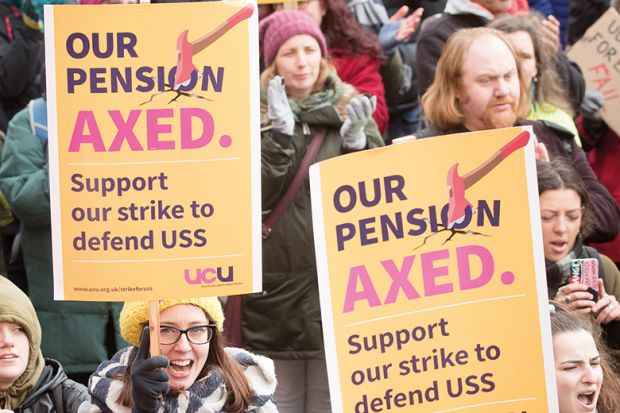The Universities Superannuation Scheme (USS) is to undertake a second valuation after institutions indicated that they were willing to pay more towards supporting UK higher education’s largest pension fund.
In an email to USS members on 22 November, the pension scheme announced that it will conduct an additional valuation of its funding position as of 31 March this year.
That valuation point is a year later than the date used to calculate the last triennial valuation, which estimated a deficit of £7.5 billion.
This, in turn, led to a recommendation by Universities UK that the scheme’s defined benefits scheme – under which members are guaranteed a fixed sum in retirement – should be scrapped, triggering months of staff walkouts at UK universities.
However, an independent review panel set up, appointed jointly by Universities UK and the University and College Union, reported in September that the deficit would be £3.5 billion lower if the valuation was re-run in March 2018 – largely because investment returns had been better than expected to the tune of £2 billion.
In the message to its members, the USS said that it would also undertake a second consultation with Universities UK following the new valuation.
Once this process is complete, the fund will then consider the recommendations of the independent review – known as the joint expert panel – which suggested that universities could retain the USS’ defined benefit scheme if employers paid an extra 2.1 per cent of salary into the fund and members contributed an extra 1.1 per cent of pay.
By doing so, it would “consider the scale of the additional financial risks involved, and the ways and means by which employers are willing and able to fund the risks that the trustee could contemplate taking”, the message said.
Speaking to Times Higher Education, Bill Galvin, chief executive of the USS, said that the “question we will be asking employers is about risk and whether they are willing to pay more in future”.
It would, however, be up to Universities UK to carry out the consultation, which became a focal point for criticism during last winter’s industrial action, said Mr Galvin, who acknowledged that this would again be a difficult task.
“Of all of the complex things involved in the valuation, the most difficult job is probably bringing together 350 quite different positions in terms of resource and [financial] models,” said Mr Galvin.
Earlier this month Universities UK said that its members supported the joint negotiating committee’s proposal to increase their contributions towards the USS, having consulted them on the panel’s findings.
However, the USS missive confirmed that the USS cannot avoid an increase in contributions, announced in July, which will take effect in April 2019. Staff contributions will rise to 8.8 per cent, up from 8 per cent, while employer contributions will rise from 18 per cent to 19.5 per cent.
However, it indicates that it hopes that an alternative way forward will be agreed before the further significantly higher cost-sharing increases come into effect from October 2019 onwards.
Further rises to 10.4 per cent in October 2019 and 11.7 per cent in April 2020 are planned for members, while employer hikes will send rates to 22.5 per cent and 24.9 per cent respectively at the same dates.
The updated valuation is set to be published in early February and the joint negotiating committee, comprising union and university representatives, will then consider how to address the outcome.
Register to continue
Why register?
- Registration is free and only takes a moment
- Once registered, you can read 3 articles a month
- Sign up for our newsletter
Subscribe
Or subscribe for unlimited access to:
- Unlimited access to news, views, insights & reviews
- Digital editions
- Digital access to THE’s university and college rankings analysis
Already registered or a current subscriber? Login








